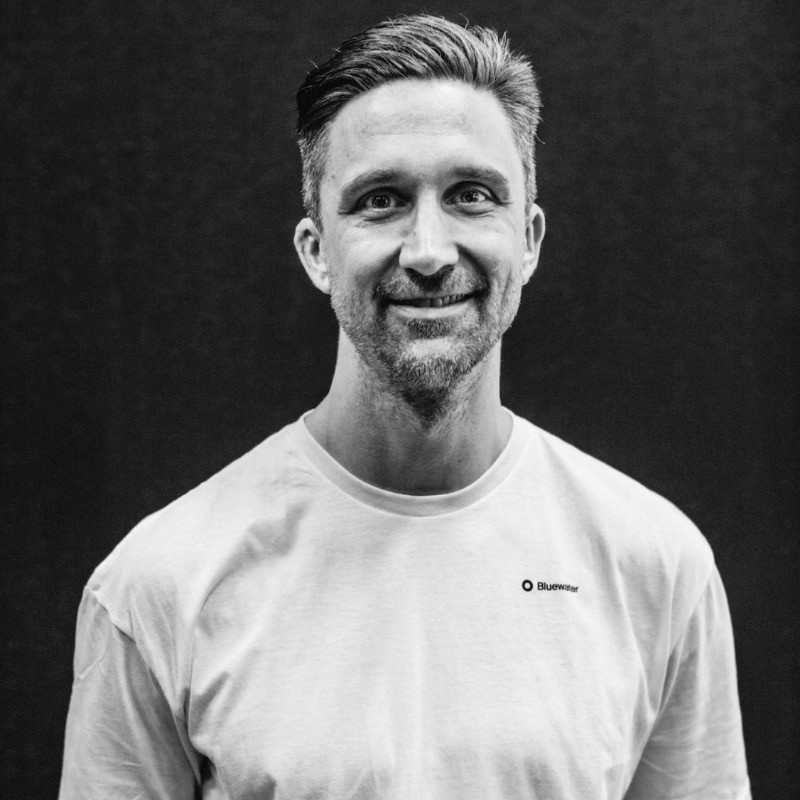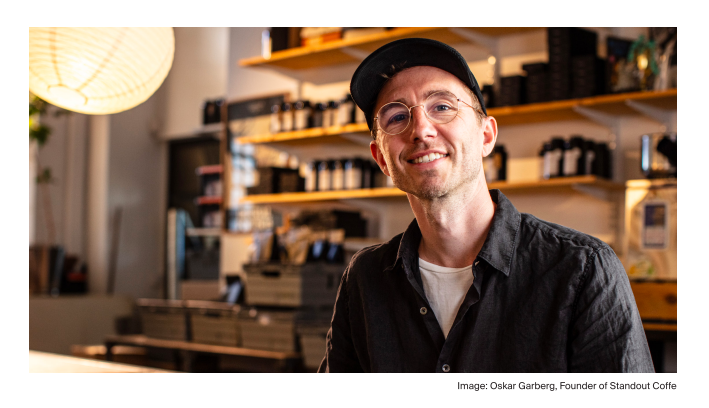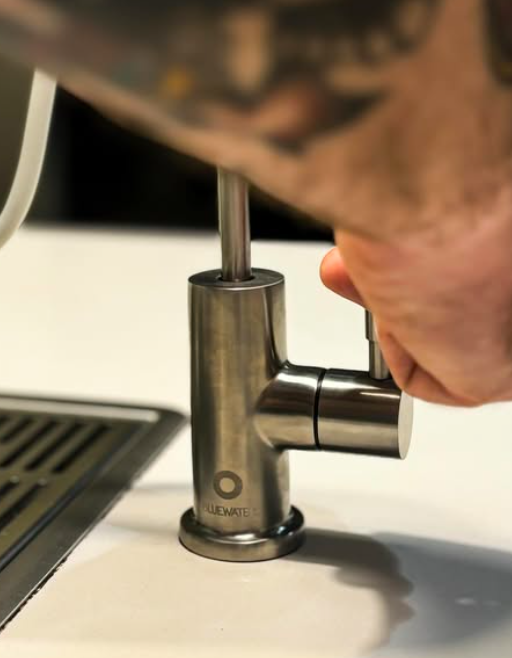You'll have heard it many times before, but we'll say it again: coffee is 98,5% water! So the water you brew your coffee with makes all the difference to the flavour you can get from them beans. Bluewater Group is coming in guns blazing and aggressively breaking into the specialty coffee market. We tasked Katie Burnett with finding out more from the source, Max Lundin of Bluewater Group.
Interview by Katie Burnett
Have you ever wondered why your coffee tastes so different when you travel? Why you just can’t seem to replicate the coffee you brew at home? Chances are, it’s the difference in the water. The main ingredient in your cup of coffee is water. Therefore, it’s no surprise that the quality of your water is extremely important for the quality of your brew. Water is often the most overlooked component of brewing coffee.
Bluewater Group is tackling this idea with their innovative water filtration and mineralisation system, and in September 2024, they launched in South Africa. I interviewed Max Lundin, manager of product marketing at Bluewater Group to find out more about their world-first approach to water purification.

Together with some of the world’s leading specialty coffee professionals and businesses, such as Standout Coffee and Daytrip, they have developed a system for optimal extraction, flavour and espresso machine care.
In most cafés, a traditional reverse osmosis water system is used. This system uses a reverse osmosis process to purify the water, stripping it of contaminants as well as minerals. This purified water is very acidic and not ideal for espresso brewing as well as corrosive to espresso machines. Minerals need to be reintroduced to the water to avoid corrosion and optimize extraction potential. The most common solution to this is a static filter system that reintroduces minerals. Max explains that “‘static minerals filter’ means that the minerals are fixed in a cartridge, without the ability to adjust or customize the mineral content in the water. This static nature limits flexibility and the ability to find the perfect mineral blend for different coffee beans.” Additionally, the way in which most of these filters are constructed results in a high volume of minerals being released in it’s early life, but over time it releases less and less minerals.

To try and combat this and increase mineral content in this stage of the system’s life, a bypass valve is installed which allows for unpurified water to bypass the purification system and be introduced to the purified water in order to utilise the minerals in the “dirty” water. Max goes on, “to have a steady TDS level of minerals, our competitors have installed a bypass valve which enables the customer to open up a valve to let dirty water that also contains the important minerals, back into the purified and mineralized water. It’s a bad solution if you look at what the customer is asking for. A clean water that tastes great for their coffee with a steady mineral content.”
The BlueWater system is a completely new approach. The system will purify the water all the way to 4 TDS. The minerals in the BlueWater system are a liquid concentrate and can be controlled through an app, ensuring that the minerals are evenly distributed at all times and throughout the life of the system, allowing for consistent water. These liquid minerals can then be purchased and topped up as needed. Max comments on the mineral mix that BlueWater have designed to optimise extraction, “This formula is made for maximum absorption of calcium and magnesium and that we had to start with a baseline. We have gotten a ton of messages about how smooth it makes their espressos taste and feel. And of course, we aren’t stopping there. More to come.”
When water is boiled, the bonds within the molecules of the water are broken. The same applies to all of the minerals and contaminants in the water. BlueWater have specifically formulated their minerals to be optimal at coffee brewing temperatures, between 90°C and 96°C, “The formula we use for making our minerals are made with the function of the water being boiled but without the natural breaking of bonds that cause scaling. So our remineralization doesn’t cause scaling and the barista can safely play around with different levels with that in mind.”
In the coffee business podcast, Coffee Made Me Do It, Max raises an interesting question. Water usually contains contaminants like microplastics, bacteria, viruses, metals and PFAs, which make up a large part of the TDS in the water. With water that is completely free of these, and the TDS is made up only of minerals, should we be reframing our ideas of what the ideal TDS is for coffee brewing? As Max says, does this mean that “70 is the new 120?”.

The BlueWater Café Station has 4 water recipes for users to choose from. Light, Original, Medium and Bold; Light having the lowest TDS (70ppm) and Bold having the highest (270ppm). Bold “enhances body without overwhelming acidity”, while Light “enhances fruity and floral flavour notes”. The beauty of the system might be in the relative ease of switching between these two options. For example, using the Light recipe for filter coffee and using the Medium recipe for your espresso machine. It is truly the next step from what specialty coffee cafés have traditionally used to filter their city water.
I asked Max how cafés using their Café Station have found their experience. Have the adjusted their approach to brewing after introducing this new water system, “The feedback is that they are creating new recipes and routines due to the consistency of the TDS and not having to be concerned about the scaling.” Furthermore, BlueWater has a close relationship with the Specialty Coffee Association, We have a great collaboration with the SCA in place and we have been successfully supplied our water to competitions and barista training events in the EU and US (including World of Coffee Copenhagen 2024). We are looking forward to move further with that collaboration as we enter more markets in 2025.” BlueWater will be the official water partner of World of Coffee Dubai 2025.
BlueWater reaches beyond the café environment with their Restaurant Station, Home Station, Hotel Station, Indoor Station, Emergency Station and Kitchen Station (which is about to be launched). I asked Max what we could look forward to regarding the launch of the Kitchen Station. “ Usually, people reach out to us asking, ‘What can I do about my water?’; With the Kitchen Station, we can flip the narrative. With the launch of this product, we can finally ask our customers, ‘What do you want your water to do for you?’
The release of the Kitchen Station is exciting because it brings a professional-grade water experience directly into your home. It’s the perfect product for home baristas and coffee
enthusiasts looking to take their brewing to competition-level quality. Imagine having full control over your water’s mineral composition to perfectly tailor it to your coffee’s profile. With the Kitchen Station, you can adjust mineral settings to match your beans and brewing methods on a daily basis. It’s like creating your own water recipe for every cup.
Beyond coffee, the Kitchen Station also provides the purest and healthiest water straight from your tap, making it an exceptional solution for drinking water. By removing 99.7% of all contaminants and delivering perfectly mineral-balanced water, it supports the health and well-being of your entire household.”
BlueWater is taking the specialty coffee world by storm, their needle-precise approach to solving the real world problems of water filtration in cafés has put them firmly in the leading position of water innovation. Their pioneer culture will pull the industry forward and inspire new approaches to the water we use to brew our coffee, and shine a light on how important it is. It is exciting to have BlueWater available in South Africa, and hopefully we see the Café Station in more of our local cafés as we all start to pay a bit more attention to our water.